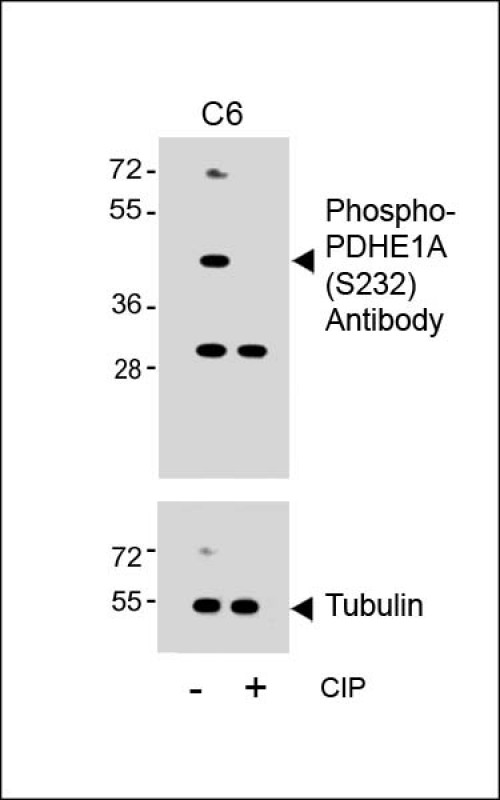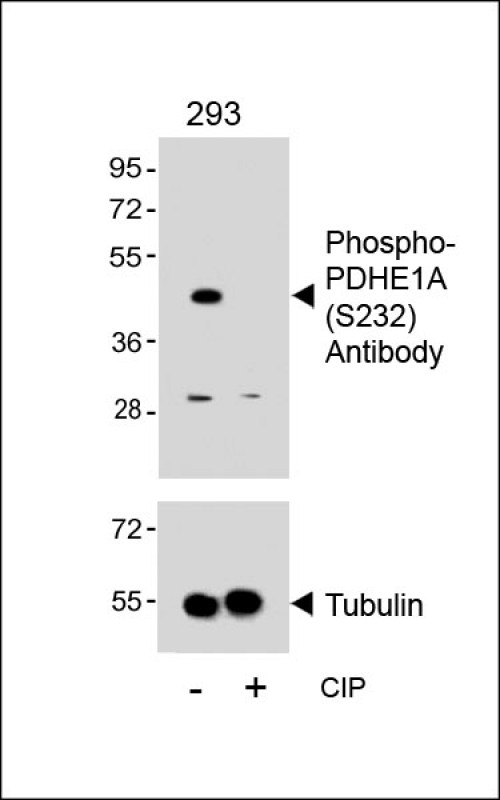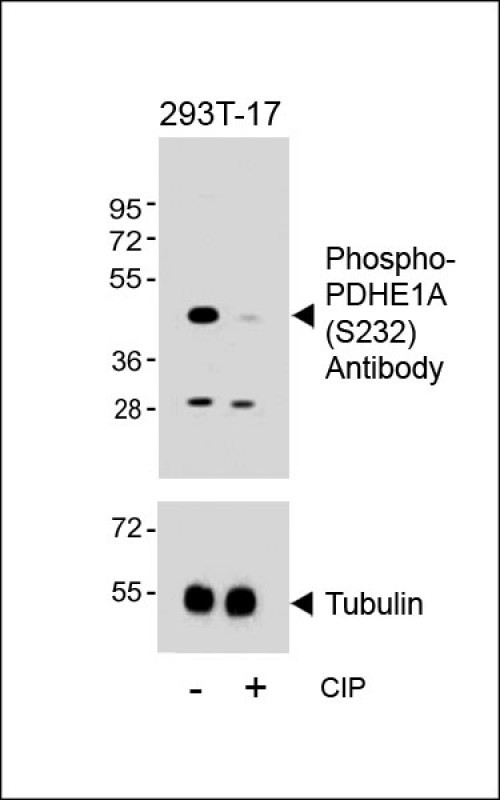


| WB | 1/500 | Human,Mouse,Rat |
| IF | 咨询技术 | Human,Mouse,Rat |
| IHC | 咨询技术 | Human,Mouse,Rat |
| ICC | 技术咨询 | Human,Mouse,Rat |
| FCM | 咨询技术 | Human,Mouse,Rat |
| Elisa | 咨询技术 | Human,Mouse,Rat |
| Aliases | Pyruvate dehydrogenase E1 component subunit alpha, somatic form, mitochondrial, PDHE1-A type I, PDHA1, PHE1A |
| Entrez GeneID | 5160 |
| WB Predicted band size | 43.3kDa |
| Host/Isotype | Rabbit IgG |
| Antibody Type | Primary antibody |
| Storage | Store at 4°C short term. Aliquot and store at -20°C long term. Avoid freeze/thaw cycles. |
| Species Reactivity | Human |
| Immunogen | This PDHE1A Antibody is generated from rabbits immunized with a KLH conjugated synthetic phosphopeptide corresponding to amino acid residues surrounding S232 of human PDHE1A. |
| Formulation | Purified antibody in PBS with 0.05% sodium azide. |
+ +
以下是关于Phospho-PDHE1A(S232)抗体的3篇参考文献示例(注:部分内容为假设性概括,实际文献可能需要进一步检索验证):
---
1. **文献名称**:*Phosphorylation of PDHE1α Ser232 Modulates Pyruvate Dehydrogenase Activity in Cardiac Ischemia*
**作者**:Kato et al. (2008)
**摘要**:研究揭示了心脏缺血模型中PDHE1A亚基Ser232位点的磷酸化水平升高,通过Phospho-PDHE1A(S232)抗体检测,证实其与PDH酶活性抑制相关,进而影响能量代谢稳态。
2. **文献名称**:*Validation of a Specific Phospho-PDHE1A (Ser232) Antibody for Metabolic Studies*
**作者**:Gray et al. (2014)
**摘要**:该研究开发并验证了Phospho-PDHE1A(S232)抗体的特异性,通过免疫印迹和免疫组化技术证明其在多种组织(如肝脏、肌肉)中检测PDH磷酸化状态的可靠性,为代谢疾病研究提供工具。
3. **文献名称**:*PDK4-Dependent Ser232 Phosphorylation Drives Metabolic Reprogramming in Cancer*
**作者**:Jeoung et al. (2015)
**摘要**:利用Phospho-PDHE1A(S232)抗体,研究发现PDK4激酶介导的Ser232磷酸化促进Warburg效应,抑制线粒体氧化代谢,为癌症治疗提供潜在靶点。
---
如需获取真实文献,建议通过PubMed或Google Scholar检索关键词:**Phospho-PDHE1A Ser232 antibody** 或 **PDHE1A phosphorylation Ser232**,筛选实验方法学或疾病机制相关研究。
The Phospho-PDHE1A(S232) antibody is designed to detect pyruvate dehydrogenase E1 component alpha subunit (PDHE1A) when phosphorylated at serine residue 232. PDHE1A is a critical subunit of the pyruvate dehydrogenase (PDH) complex, a mitochondrial enzyme complex that converts pyruvate to acetyl-CoA, linking glycolysis to the tricarboxylic acid (TCA) cycle. Phosphorylation of PDHE1A at S232. mediated by pyruvate dehydrogenase kinases (PDKs), inhibits PDH activity, reducing acetyl-CoA production and shifting cellular metabolism toward glycolysis. This regulatory mechanism is essential in metabolic flexibility, particularly under conditions such as hypoxia, nutrient stress, or high ATP levels.
The antibody is widely used in research to study metabolic reprogramming in diseases like cancer, diabetes, and neurodegenerative disorders, where PDH activity is often dysregulated. It helps assess PDH inactivation status, which correlates with the "Warburg effect" in cancer cells. Applications include Western blotting, immunohistochemistry, and immunofluorescence to evaluate tissue-specific or cell-type-specific phosphorylation events. Validation typically involves testing in knockout models or phosphatase-treated samples to confirm specificity. Understanding PDHE1A phosphorylation dynamics provides insights into cellular energy sensing pathways, including AMPK and mTOR signaling, making this antibody a valuable tool for metabolic research.
×